Many people struggle with sleep issues and are turning to natural supplements for relief. Two popular options that often get paired together are L-theanine and magnesium. Social media users frequently recommend this combination, but the question remains whether science supports these claims.
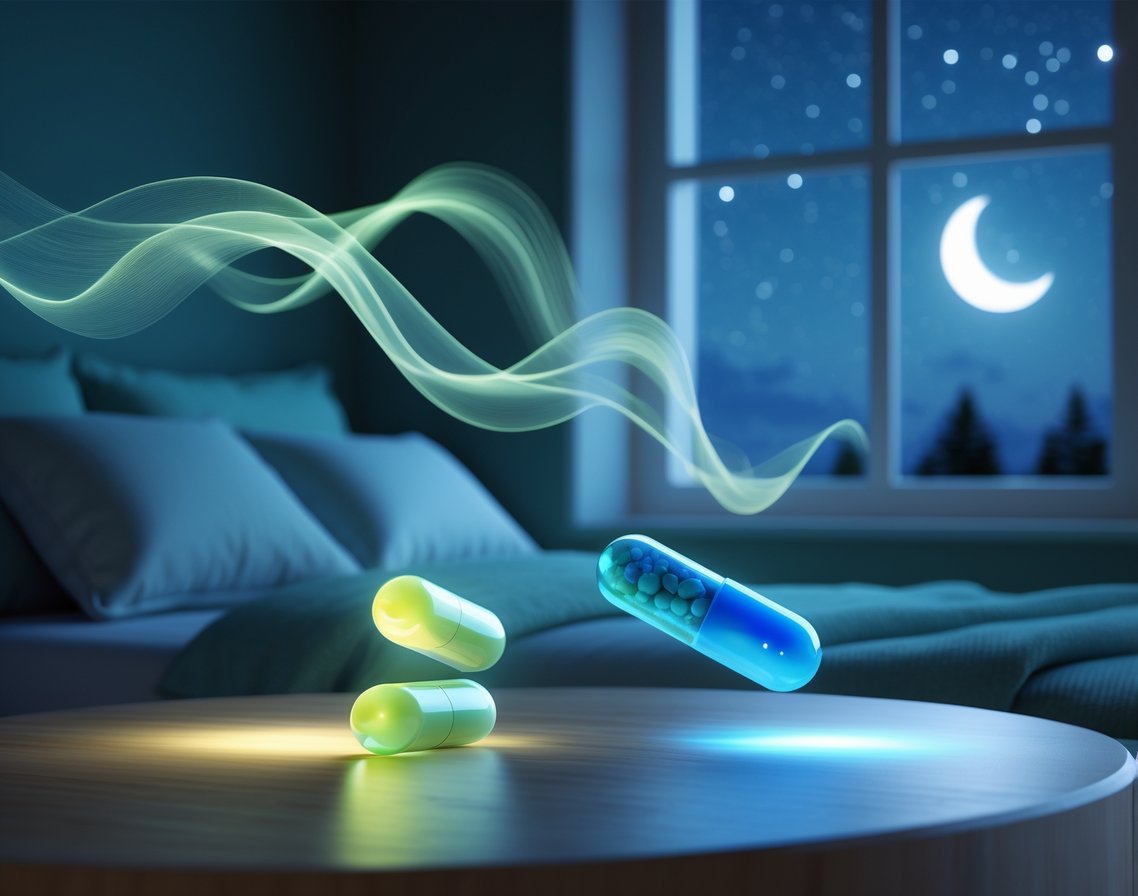
Current research shows that magnesium and L-theanine may each help with sleep[1] because they help people unwind, though experts say there isn’t enough data to strongly recommend taking them together. Magnesium has solid evidence for reducing anxiety, stress, and improving sleep quality. L-theanine, an amino acid found in green tea, promotes relaxation but may also increase focus in some people.
The reality is more complex than simple social media recommendations suggest. While taking these supplements together might enhance relaxation and sleep effects[2], individual responses vary significantly. Understanding how each supplement works, proper dosing, and potential interactions is essential before trying this popular sleep stack.
Key Takeaways
- L-theanine and magnesium may individually support better sleep through different mechanisms in the body
- The combination lacks strong scientific evidence but appears safe for most healthy adults when used properly
- Good sleep habits remain more important than any supplement for addressing underlying sleep problems
How L-Theanine and Magnesium Improve Sleep
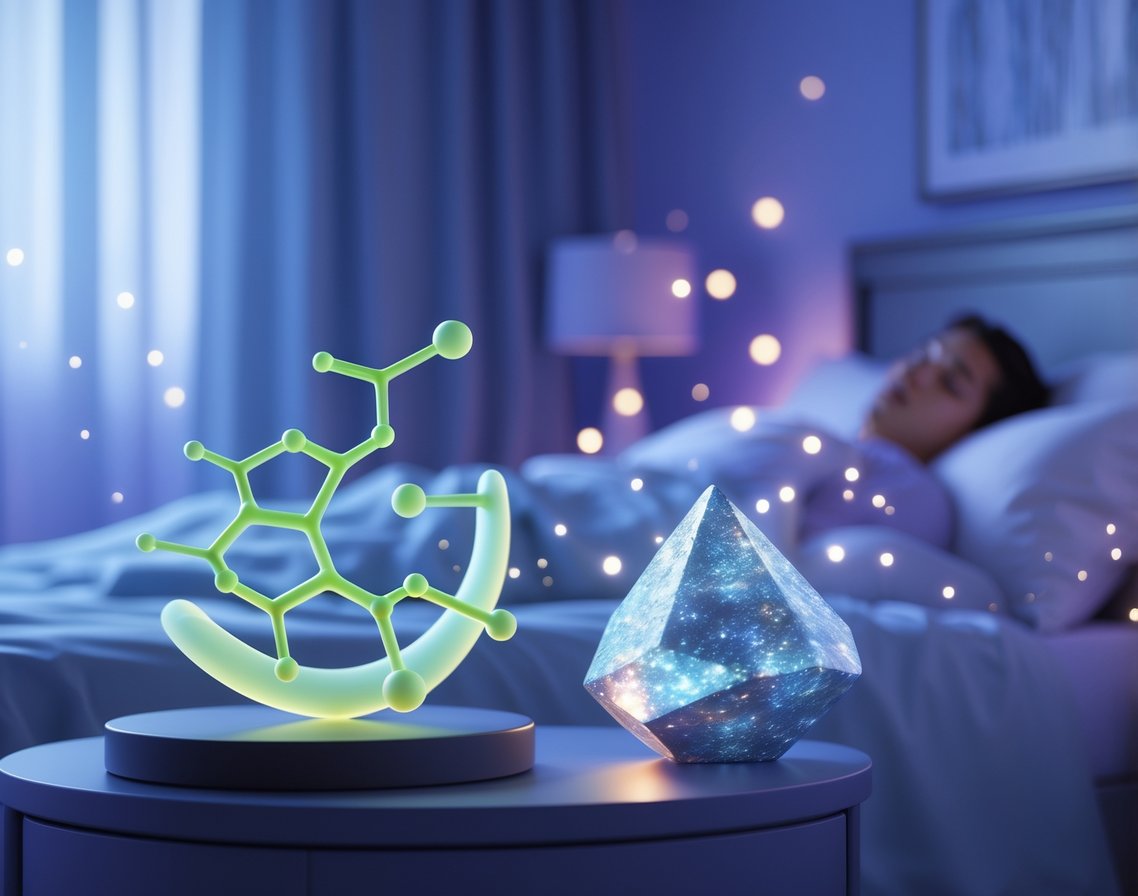
L-theanine and magnesium work through complementary brain pathways to promote better sleep by enhancing GABA activity, regulating neurotransmitters, and reducing cortisol levels. Research shows these compounds can improve sleep quality through inhibitory neurotransmitters[3] and help people fall asleep faster while staying asleep longer.
Mechanisms Supporting Relaxation and Fall Asleep Faster
L-theanine crosses the blood-brain barrier and increases alpha brain wave activity within 30-40 minutes. These alpha waves create a calm, focused state similar to meditation.
The amino acid also boosts GABA production in the brain. GABA acts as the body’s main “brake pedal” for the nervous system, slowing down racing thoughts and physical tension.
Magnesium works differently but supports the same goal. It blocks NMDA receptors that cause brain excitement and inflammation. This mineral also activates the parasympathetic nervous system.
Key relaxation mechanisms include:
- Increased alpha wave production (8-12 Hz frequency)
- Enhanced GABA receptor sensitivity
- Reduced cortisol and stress hormone release
- Lowered heart rate and blood pressure
Together, these compounds create a powerful foundation for overall brain health[4] and faster sleep onset. Most people notice effects within 45-60 minutes of taking both supplements.
Effects on Sleep Quality and Sleep Cycles
Research demonstrates that Mg-L-theanine compounds increase sleep duration and slow wave powers[3] compared to either supplement alone. This combination enhances both light and deep sleep phases.
L-theanine specifically improves non-REM sleep quality. Non-REM sleep includes the deepest, most restorative stages when the body repairs tissues and consolidates memories.
Magnesium helps regulate melatonin production and timing. Proper melatonin levels ensure healthy circadian rhythms and natural sleep-wake cycles.
Sleep quality improvements include:
- Longer deep sleep phases (stages 3-4)
- More consistent REM sleep cycles
- Reduced sleep fragmentation
- Better morning alertness and recovery
The combination also increases serotonin and dopamine levels in the brain. These neurotransmitters support mood regulation and help maintain stable sleep patterns over time.
Studies show people taking both supplements report feeling more refreshed upon waking and experience fewer mid-sleep disruptions.
Role in Reducing Insomnia and Nighttime Awakenings
Clinical research shows l-theanine and magnesium supplementation can help with sleep disturbances and improve sleep quality[5] for people with chronic insomnia. The compounds address multiple causes of sleep problems.
Magnesium deficiency affects up to 50% of adults and directly contributes to insomnia symptoms. Low magnesium levels cause muscle tension, restless legs, and frequent wake-ups.
L-theanine helps quiet mental chatter and worry that keeps people awake. It reduces the stress response without causing drowsiness during daytime hours.
Insomnia benefits include:
- Shorter time to fall asleep (sleep latency)
- Fewer middle-of-night awakenings
- Less early morning wake-ups
- Reduced anxiety around bedtime
The combination works especially well for stress-related sleep problems. Both supplements lower cortisol levels and help break the cycle of worry that feeds insomnia.
People with racing thoughts or physical restlessness often see the most dramatic improvements in their sleep patterns within 1-2 weeks of consistent use.
Understanding L-Theanine: The Amino Acid for Calm
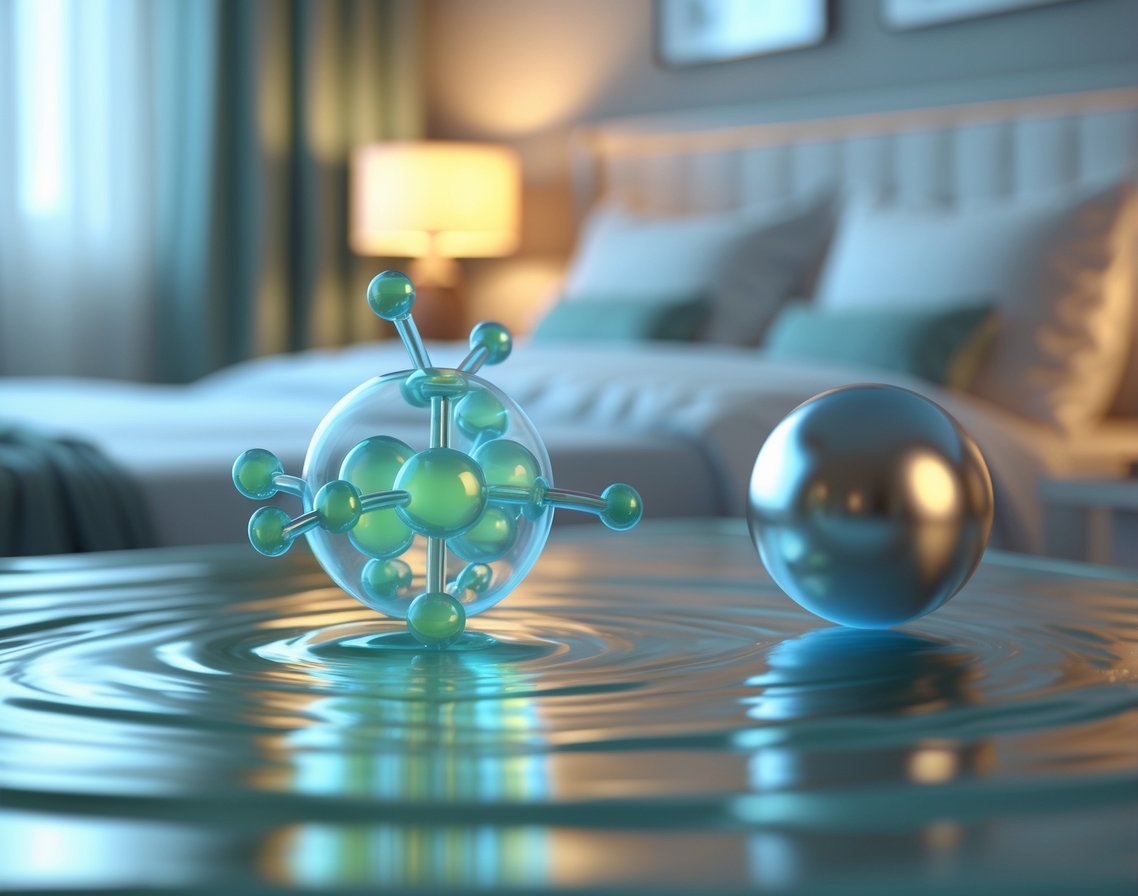
L-theanine is a unique amino acid that promotes relaxing brain activity[6] and works directly with brain chemistry to reduce stress without causing drowsiness. This compound influences key neurotransmitters like GABA, serotonin, and dopamine to enhance cognitive function while providing anxiety relief.
Natural Sources and Green Tea Origins
L-theanine occurs naturally in tea leaves, with green tea containing the highest concentrations. This amino acid is found abundantly in green tea[7] and has been consumed for centuries to promote calm and relaxation.
Black tea also contains l-theanine, though in smaller amounts compared to green tea. The amino acid gives tea its characteristic calming properties that many people notice when drinking their daily cup.
Common Natural Sources:
- Green tea (highest concentration)
- Black tea
- White tea
- Some mushroom varieties
The amount of l-theanine in tea varies based on growing conditions and processing methods. A typical cup of green tea contains 20-50 mg of l-theanine.
Impact on Brain Chemistry and Mood
L-theanine interacts directly with brain chemistry[8] to promote relaxation without drowsiness. It crosses the blood-brain barrier and influences several important neurotransmitter systems.
The amino acid increases GABA production, which is the brain’s primary calming neurotransmitter. GABA helps reduce excessive neural activity and promotes a sense of peace.
L-theanine also affects serotonin and dopamine levels. These neurotransmitters play key roles in mood regulation and feelings of well-being.
Brain Wave Changes:
- Increases alpha brain waves
- Promotes alert relaxation
- Maintains mental clarity
- Reduces beta waves associated with stress
Influence on Anxiety and Stress
L-theanine effectively reduces anxiety and stress[9] by calming the nervous system without sedation. Research shows it can lower cortisol levels and reduce the body’s stress response.
The amino acid helps people feel calm while staying mentally alert. This makes it different from many other relaxation aids that cause drowsiness or mental fog.
Studies indicate that l-theanine can reduce both physical and mental symptoms of anxiety. People often report feeling more balanced and less reactive to stressful situations.
Stress-Relief Benefits:
- Lowers cortisol production
- Reduces heart rate variability
- Decreases muscle tension
- Improves stress resilience
The calming effects typically begin within 30-60 minutes of consumption. Many people use l-theanine during high-stress periods or before challenging situations.
Potential Cognitive and Memory Benefits
L-theanine boosts mental clarity and alertness[9] while promoting cognitive function. The amino acid enhances focus by reducing distracting thoughts and mental chatter.
Research suggests l-theanine may improve working memory and attention span. It helps the brain maintain concentration for longer periods without mental fatigue.
The cognitive benefits appear most pronounced when l-theanine is combined with caffeine. This combination provides sustained mental energy without the jitters often associated with caffeine alone.
Cognitive Enhancement Effects:
- Improved focus and attention
- Enhanced working memory
- Better mental stamina
- Reduced cognitive fatigue
Memory formation may also benefit from l-theanine supplementation. The amino acid supports the brain’s ability to encode and retain new information effectively.
Magnesium’s Role in Sleep and Body Function
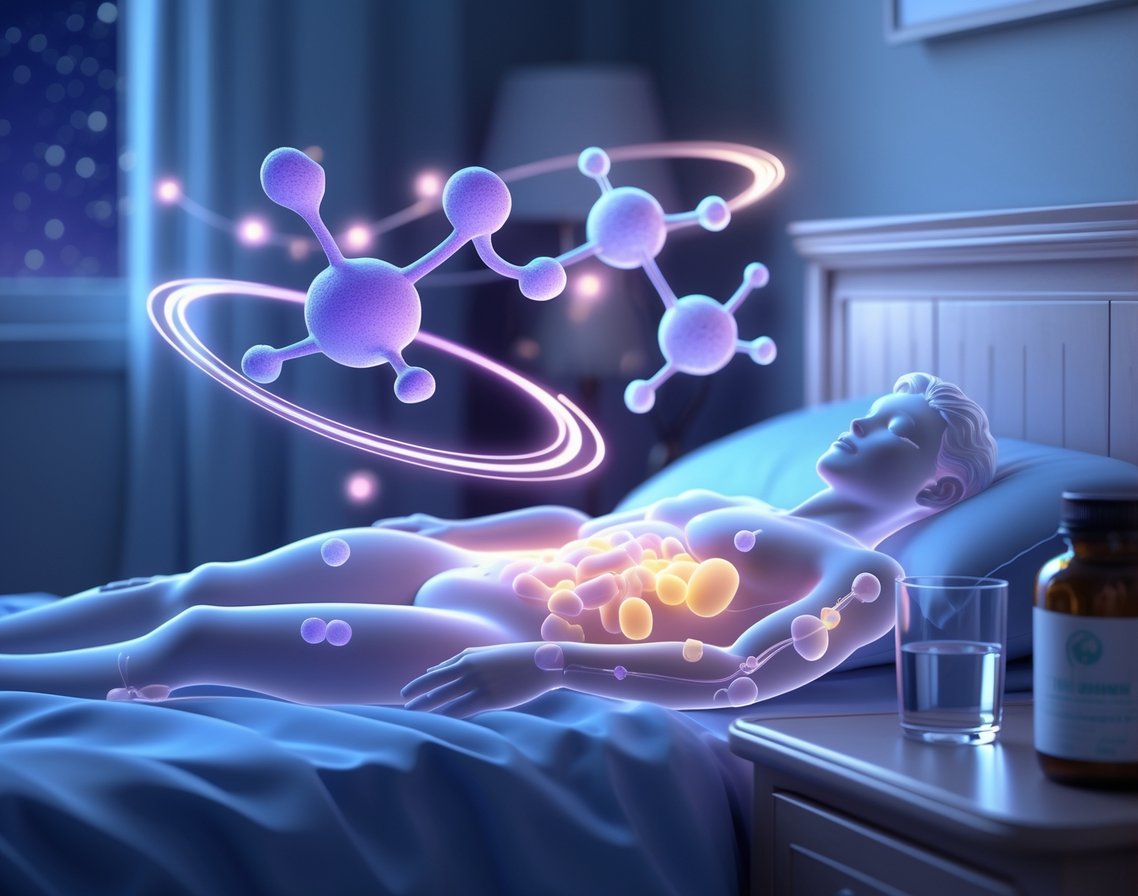
Magnesium serves as a crucial mineral that supports over 300 enzymatic reactions in the body while directly influencing sleep quality through neurotransmitter regulation and muscle relaxation. The mineral plays essential roles in nerve function, anxiety reduction, and immune system support.
Essential Mineral and Biochemical Reactions
Magnesium acts as a cofactor in more than 300 biochemical reactions throughout the human body. These reactions control everything from energy production to protein synthesis.
The mineral helps convert food into usable energy at the cellular level. It also supports DNA repair and maintains proper heart rhythm.
Key biochemical functions include:
- ATP energy production
- Protein and carbohydrate metabolism
- Blood sugar regulation
- Bone formation and maintenance
Many adults don’t get enough magnesium from their diet. Low levels can disrupt these essential processes and affect sleep quality.
The body stores about 60% of its magnesium in bones and teeth. The remaining 40% exists in muscles, soft tissues, and blood.
Connection to Nerve Function and Muscle Relaxation
Magnesium directly affects the nervous system by regulating neurotransmitters that control sleep and relaxation. It blocks certain receptors in the brain that keep people awake and alert.
The mineral works as a natural calcium channel blocker. This action helps muscles relax and reduces nerve excitability.
Magnesium also supports GABA production. GABA is the brain’s main calming neurotransmitter that promotes sleep and reduces stress.
Low magnesium levels can cause muscle cramps, restless legs, and difficulty falling asleep. These symptoms often improve when magnesium levels return to normal.
The mineral helps regulate the body’s stress response system. It can lower cortisol levels and reduce physical tension that interferes with sleep.
Magnesium Types: Glycinate and Other Forms
Different forms of magnesium offer varying absorption rates and benefits for sleep support. Magnesium glycinate provides superior bioavailability[10] and causes fewer digestive issues than other forms.
Common magnesium forms:
| Type | Absorption | Best For |
|---|---|---|
| Glycinate | High | Sleep, relaxation |
| Oxide | Low | Constipation relief |
| Citrate | Moderate | General supplementation |
| Threonate | High | Brain function |
Magnesium glycinate combines magnesium with the amino acid glycine. This combination enhances both absorption and calming effects.
The glycine component adds its own sleep-promoting benefits. It helps lower body temperature and supports deeper sleep phases.
Other effective forms include magnesium malate for energy support and magnesium taurate for heart health.
Benefits for Anxiety, Depression, and the Immune System
Magnesium deficiency links to higher rates of anxiety and depression symptoms. The mineral helps regulate mood by supporting neurotransmitter balance and stress hormone control.
Studies show magnesium supplementation can reduce anxiety scores in people with mild to moderate symptoms. It works by calming the nervous system and reducing cortisol production.
The mineral also supports serotonin production. Low serotonin levels contribute to both depression and sleep problems.
Immune system support includes:
- White blood cell function enhancement
- Inflammation reduction
- Antioxidant enzyme activation
- Wound healing acceleration
Magnesium helps maintain proper immune cell communication. It also reduces chronic inflammation that can disrupt sleep patterns.
The mineral supports the production of melatonin, the body’s natural sleep hormone. This connection explains why magnesium deficiency often leads to sleep disturbances.
Regular magnesium intake can improve both physical and mental resilience to stress. This dual benefit makes it particularly valuable for people dealing with sleep issues related to anxiety or depression.
The Synergy of L-Theanine and Magnesium for Sleep Optimization

When taken together, l-theanine and magnesium work through different brain pathways to enhance sleep quality more effectively than either supplement alone. Research shows this combination targets both mental relaxation and physical sleep mechanisms while crossing the blood-brain barrier efficiently.
How They Work Together in the Brain and Body
L-theanine and magnesium target different neurotransmitter systems that complement each other perfectly. L-theanine increases GABA activity in the brain, which reduces anxiety and promotes relaxation without causing drowsiness during the day.
Magnesium acts as a natural NMDA receptor antagonist and GABA agonist. This means it blocks excitatory signals while boosting calming ones. Research shows that magnesium-l-theanine compounds increase GABAergic and serotonergic receptor expression[3] more than l-theanine alone.
The combination also affects sleep-related hormones differently. While l-theanine primarily works on stress hormones like cortisol, magnesium helps regulate melatonin production. Together, they create a more complete approach to sleep preparation.
Both supplements cross the blood-brain barrier effectively. This allows them to directly influence brain chemistry rather than just affecting peripheral systems.
Combined Effects on Sleep Latency and Depth
Studies show that taking l-theanine and magnesium together reduces the time it takes to fall asleep. The combination improves sleep latency and duration even after caffeine administration[3], which suggests strong sleep-promoting effects.
The supplements work on different aspects of sleep architecture. L-theanine helps quiet racing thoughts and mental chatter. Magnesium relaxes muscles and reduces physical tension.
Sleep Quality Improvements:
- Faster sleep onset (reduced sleep latency)
- Deeper sleep phases
- Less nighttime awakening
- Better morning recovery
Research indicates the combination increases delta wave power in the brain. Delta waves are associated with deep, restorative sleep stages. This suggests better sleep quality, not just longer sleep duration.
The synergistic effects mean lower doses of each supplement may be needed. This reduces the risk of side effects while maintaining effectiveness.
Comparison to Other Natural Sleep Aids
L-theanine and magnesium offer advantages over other natural sleep supplements in several key areas. Unlike melatonin, which can cause morning grogginess, this combination rarely produces next-day drowsiness.
Comparison with Popular Sleep Aids:
| Supplement | Sleep Onset | Sleep Quality | Morning Alertness | Dependency Risk |
|---|---|---|---|---|
| L-theanine + Magnesium | Good | Excellent | High | Low |
| Melatonin | Excellent | Good | Moderate | Low |
| Ashwagandha | Moderate | Good | High | Low |
Ashwagandha works primarily through stress reduction and takes weeks to show full effects. The l-theanine and magnesium combination works within hours of taking it.
Many people on social media recommend this combination over single supplements[11] because of the synergistic effects. The combination addresses both mental and physical aspects of sleep problems.
Unlike prescription sleep medications, these supplements don’t create tolerance or withdrawal issues. They support natural sleep processes rather than forcing sleep through sedation.
Proper Supplementation: Dosage, Timing, and Safety
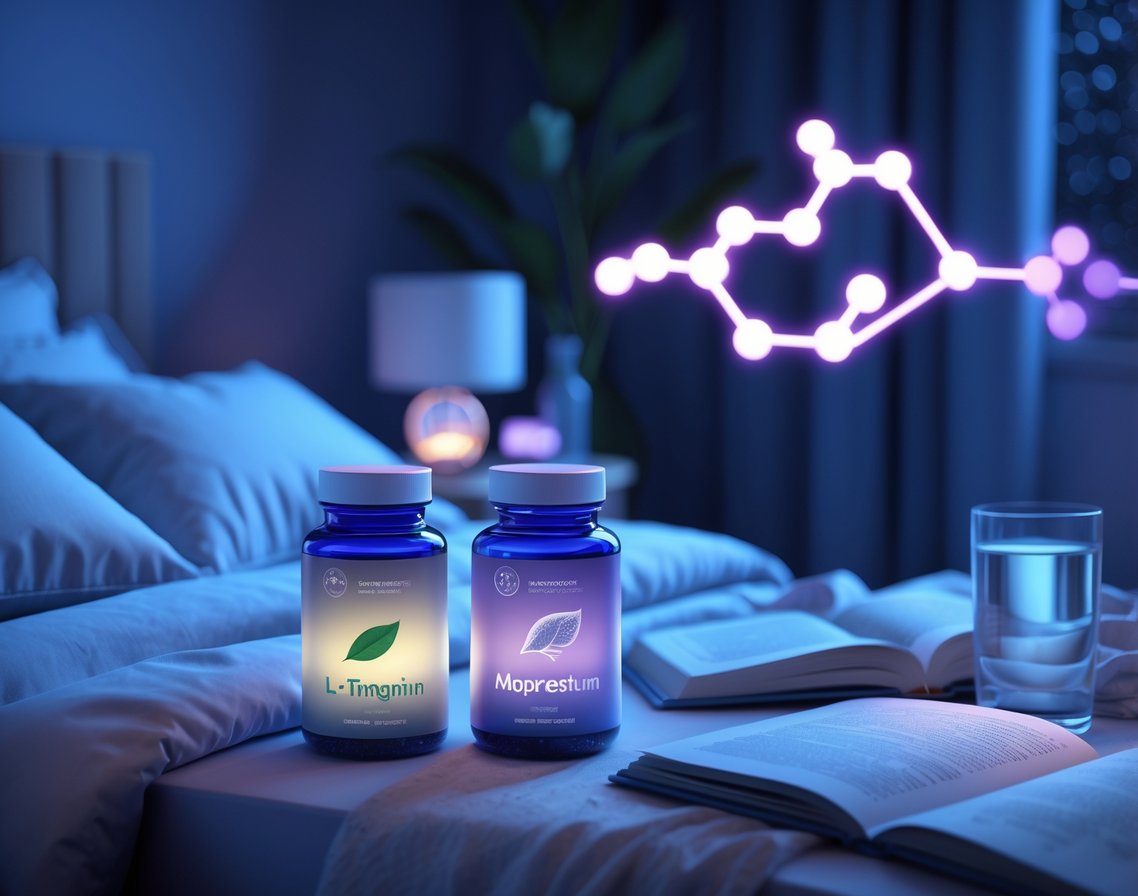
Taking the right amounts at the correct times maximizes benefits while minimizing risks. Most adults need 200-400mg of L-theanine and 200-400mg of magnesium for sleep support.
Recommended Dosages for Sleep Benefits
L-theanine dosages for sleep typically range from 200mg to 400mg taken before bedtime. Research shows doses from 200-900mg are effective[12], though the FDA considers up to 250mg daily as safe for most people.
Magnesium supplement amounts vary by type. Magnesium glycinate works well at 200-400mg nightly. Magnesium oxide requires higher doses of 400-600mg due to lower absorption rates.
People should start with lower doses to assess tolerance. A beginner might try 100mg L-theanine with 200mg magnesium glycinate.
Individual factors affect optimal dosing:
- Body weight
- Stress levels
- Sleep difficulties severity
- Other medications
Optimal Timing and Stacking Strategies
L-theanine timing depends on the intended benefit[13]. For sleep, taking it 30-60 minutes before bedtime allows proper absorption.
Magnesium works best when taken 1-2 hours before sleep. This timing prevents stomach upset and allows the mineral to promote muscle relaxation.
Effective stacking approach:
- Take magnesium supplement with dinner
- Take L-theanine 30-60 minutes before bed
- Avoid caffeine after 2 PM
Some people combine both supplements 1 hour before bedtime. This method works when using magnesium glycinate, which causes less digestive upset than other forms.
Possible Side Effects and Safety Considerations
Common L-theanine side effects include headaches and stomach upset[12]. Some people experience drowsiness or trouble concentrating the next day.
Magnesium side effects depend on the type:
- Magnesium oxide: Diarrhea, stomach cramps
- Magnesium glycinate: Minimal side effects, occasional drowsiness
- Magnesium citrate: Loose stools, digestive upset
People taking blood pressure medications should consult doctors before adding magnesium supplements. The mineral can enhance medication effects.
Safety precautions:
- Start with lower doses
- Take with food to reduce stomach upset
- Avoid exceeding recommended amounts
- Monitor for interactions with prescription drugs
Pregnant women and people with kidney problems need medical approval before supplementation.
Additional Health Impacts Beyond Sleep
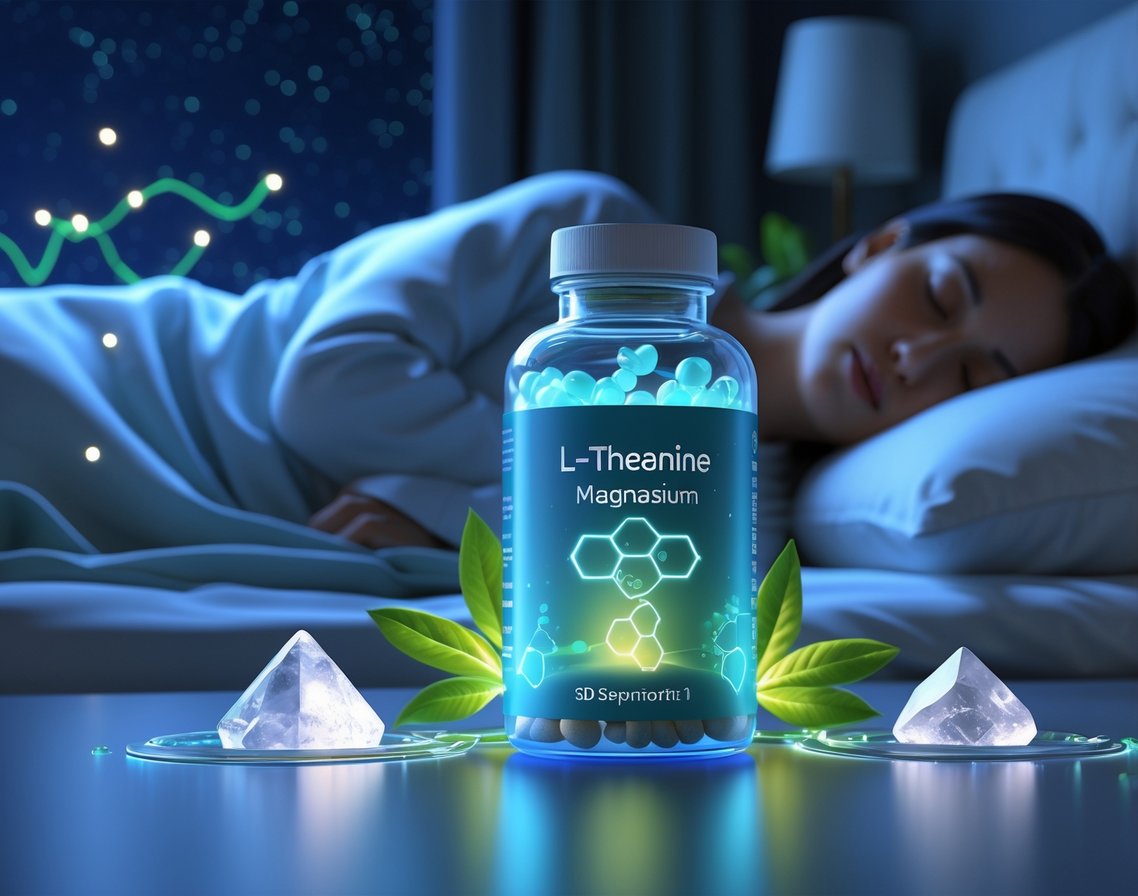
L-theanine and magnesium offer benefits that extend well beyond sleep improvement. These supplements can support cardiovascular health by helping regulate blood pressure and enhance cognitive abilities including focus, memory, and learning capacity.
Influence on Blood Pressure and Cardiovascular Health
L-theanine may help lower blood pressure in people who experience stress-related increases. The amino acid promotes relaxation without causing drowsiness, which can reduce the cardiovascular strain that comes with chronic stress.
Studies show that L-theanine can decrease both systolic and diastolic blood pressure during stressful situations. This effect happens because L-theanine influences brain chemicals that control the body’s stress response.
Magnesium plays a crucial role in heart health and blood vessel function. People with low magnesium levels often have higher blood pressure readings.
Key cardiovascular benefits include:
- Improved blood vessel flexibility
- Better regulation of heart rhythm
- Reduced inflammation in blood vessels
- Support for healthy cholesterol levels
The mineral helps relax smooth muscle in blood vessel walls. This relaxation allows blood to flow more easily, which can lower overall blood pressure.
Interactions with Energy, Learning, and Cognitive Performance
L-theanine creates a unique state of calm alertness that can improve focus and learning ability. Unlike caffeine, it increases attention without causing jitters or energy crashes.
Research shows L-theanine enhances alpha brain wave activity. These brain waves are linked to creative thinking and improved concentration during mental tasks.
The amino acid works particularly well when combined with small amounts of caffeine. This combination can boost cognitive performance more than either substance alone.
Magnesium supports energy production at the cellular level. It helps convert food into usable energy and maintains proper nerve function throughout the brain.
Cognitive benefits of magnesium include:
- Better memory formation
- Improved learning speed
- Enhanced mental clarity
- Reduced brain fog
Low magnesium levels can lead to difficulty concentrating and mental fatigue. Adequate magnesium intake supports the brain’s ability to form new connections, which is essential for learning new information.
Frequently Asked Questions
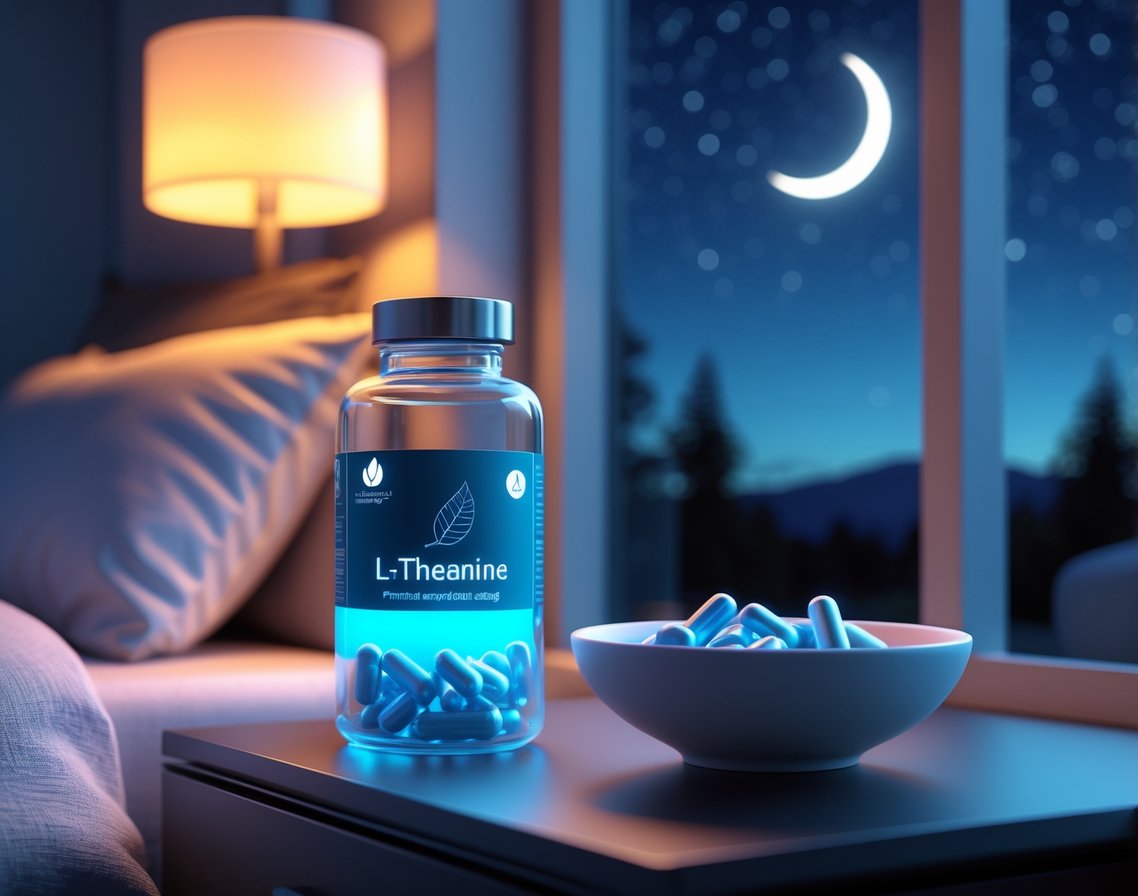
Many people wonder about dosages, side effects, and how these two supplements work together. Understanding the specific benefits and potential interactions helps users make informed decisions about their sleep routine.
What are the potential benefits of taking L-theanine and magnesium glycinate together for sleep?
The combination targets both mental and physical aspects of sleep. L-theanine calms racing thoughts by increasing alpha brain waves and boosting GABA production. Magnesium glycinate relaxes muscles and supports melatonin production.
Together, they may help people fall asleep faster and experience deeper sleep. Taking L-theanine and magnesium together can enhance relaxation[14] by addressing both mind and body tension.
The duo works through different pathways, making their effects complementary rather than overlapping. This creates a more complete approach to sleep support than either supplement alone.
Can combining L-theanine with magnesium produce any side effects?
Both supplements are generally well-tolerated when taken in recommended amounts. L-theanine rarely causes side effects but may occasionally lead to mild headaches or dizziness in sensitive individuals.
Magnesium glycinate can cause digestive upset if taken in excessive doses. Some people experience nausea or loose stools, especially when first starting supplementation.
Side effects are uncommon when proper dosages are followed[14]. Starting with lower doses allows the body to adjust gradually.
How do L-theanine and magnesium glycinate specifically contribute to improved sleep quality?
L-theanine promotes relaxation without drowsiness by increasing calming neurotransmitters like GABA and serotonin. It helps quiet mental chatter that often keeps people awake at night.
Magnesium glycinate regulates the nervous system and helps produce melatonin. It also relaxes muscles, reducing physical tension that can interfere with sleep.
The glycinate form of magnesium is particularly gentle on the stomach. This makes it suitable for bedtime use without causing digestive discomfort.
Are there any substances or supplements that should be avoided when taking L-theanine and magnesium?
People taking blood pressure medications should consult their doctor before adding magnesium supplements. Magnesium can enhance the effects of certain heart medications.
Those with kidney problems should avoid magnesium supplements entirely. The kidneys regulate magnesium levels, and impaired function can lead to dangerous buildup.
Excessive alcohol consumption may interfere with both supplements’ effectiveness. Alcohol disrupts sleep quality and can counteract their calming effects.
What is the recommended dosage for L-theanine and magnesium to optimize sleep?
Most people benefit from 200-400 mg of L-theanine taken 30-60 minutes before bedtime. This amount provides relaxation without causing next-day grogginess.
A common approach combines 200 mg of L-theanine with 200-300 mg of magnesium glycinate[14] before bed. This dosage balances effectiveness with safety.
Starting with lower doses allows individuals to assess their tolerance. Some people may need adjustments based on their response and sleep needs.
Can L-theanine and magnesium be taken with other supplements like ashwagandha for enhanced sleep benefits?
Ashwagandha can complement L-theanine and magnesium by addressing stress-related sleep issues. All three supplements work through different mechanisms to support relaxation.
Research shows combinations of magnesium, L-theanine, and other calming compounds can reduce daytime sleepiness[15]. This suggests synergistic effects when used together.
However, adding multiple supplements increases the risk of interactions. People should introduce one supplement at a time to monitor individual responses before combining them.
References
- magnesium and L-theanine may each help with sleep. https://www.verywellhealth.com/magnesium-and-l-theanine-8730236 Accessed November 9, 2025
- taking these supplements together might enhance relaxation and sleep effects. https://www.health.com/l-theanine-and-magnesium-8639718 Accessed November 9, 2025
- A Novel Theanine Complex, Mg-L-Theanine Improves Sleep Quality via Regulating Brain Electrochemical Activity. https://pmc.ncbi.nlm.nih.gov/articles/PMC9017334/ Accessed November 9, 2025
- The Science-Backed Benefits of Taking L-Theanine and Magnesium Together for Cognitive Health and Sleep. https://nootropicsplanet.com/science-backed-benefits-of-taking-l-theanine-and-magnesium/ Accessed November 9, 2025
- Can You Take L-Theanine and Magnesium Together?. https://moonjuice.com/en-ca/blogs/supplements/l-theanine-and-magnesium-together Accessed November 9, 2025
- L-Theanine for Sleep. https://www.sleepfoundation.org/sleep-aids/l-theanine-for-sleep Accessed November 9, 2025
- What is L-theanine? Here’s everything you need to know!. https://www.suntheanine.com/what-is-l-theanine/ Accessed November 9, 2025
- Attention Required!. https://cenario.com/blog/supplements/l-theanine-the-amino-acid-for-calm-anxiety-relief-and-better-sleep/ Accessed November 9, 2025
- L-Theanine: What It Is and 3 Benefits. https://health.clevelandclinic.org/l-theanine Accessed November 9, 2025
- Menopause MD Reveals The 4 Most Effective Supplements For Women. https://www.mindbodygreen.com/articles/menopause-md-reveals-4-most-effective-supplements-for-women Accessed November 9, 2025
- Many people on social media recommend this combination over single supplements. https://www.verywellhealth.com/magnesium-and-l-theanine-8730236/ Accessed November 9, 2025
- Research shows doses from 200-900mg are effective. https://www.verywellhealth.com/l-theanine-for-sleep-8728007 Accessed November 9, 2025
- How Long Does L-Theanine Take to Work? A Science-Backed Guide to Timing and Effects. https://nootropicsplanet.com/how-long-l-theanine-take-to-work/ Accessed November 9, 2025
- Is It Safe to Take L-Theanine and Magnesium Together?. https://myhealthopedia.com/can-you-take-l-theanine-and-magnesium-together/ Accessed November 9, 2025
- Can You Take L-Theanine and Magnesium Together?. https://moonjuice.com/blogs/supplements/l-theanine-and-magnesium-together/ Accessed November 9, 2025
